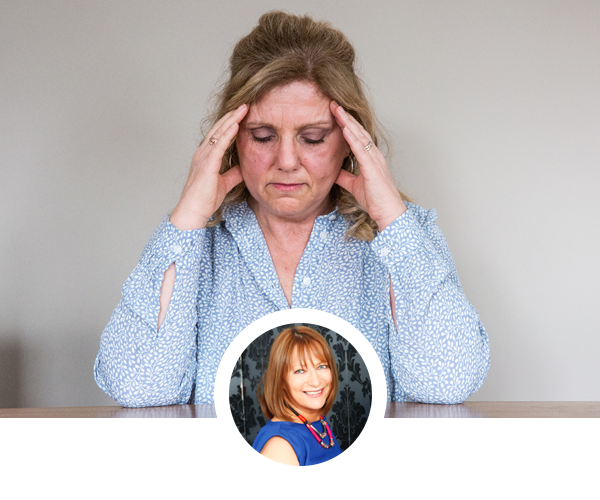Do menopause symptoms cause stress?

Do menopause symptoms cause stress? Or does stress cause menopause symptoms?
It’s a chicken or egg situation.
I believe the answer to be both. It’s a vicious circle of events; the menopause causing stress, the stress contributing towards the increased severity or number of symptoms, which in turn adds to even greater stress. As if there isn’t enough of that going on in your life at the moment already!
Between the ages of 45 and 55 may well be struggling with unpleasant menopause symptoms. This time is also referred to as the ‘sandwich’ years when you may also be faced with an increasing number of external, often chronic, stressors. Think children growing up/leaving home, aging and ailing parents, relationship reviews, finances, working for longer. Basically ‘life’.
You may feel that you have very little control over those external stressors in your life? But true to form, you continue to ‘manage’ and ‘cope’ however difficult that may be. Maybe you’re constantly making everything OK or everyone else, running around after others, not having time to prioritise yourself? Maybe prioritising yourself brings up negative emotions of guilt? Creating more stress?
Whenever long-term stress occurs, the stress hormone cortisol is secreted which creates a biochemical change in your body impacting on your hormones and symptoms, both emotional and physical. This biochemical change I refer to as your ‘Internal Stress’.
There are three main points here that I’d like to share with you, plus some simple actions to help reduce that internal stress and reduce unpleasant menopause symptoms.
Shared Responsibilities
Cortisol is secreted by the adrenal glands, two tiny walnut shaped glands that sit in the body above the kidneys. They may be small, but they certainly pack a punch! The hormone cascade in the adrenal glands involving cortisol also embraces the menopause hormones you may be more familiar with, i.e. testosterone, progesterone and oestrogen. Collectively these four hormones are nurtured by a ‘mother’ hormone called pregnenolone.
Cortisol is the fight or flight hormone in place to keep you safe in the face of danger. However, it can’t differentiate between the immediate stress of a double decker bus screaming down the road towards you or the constant stress of the daily traffic jam driving to and from work. As cortisol is so important for keeping you safe, it has first call on pregnenolone leaving insufficient to support the other hormones which are already struggling, adding to many physical and emotional symptoms often attributed solely to menopause.
Including: hot flushes, night sweats, anxiety, fatigue, brain fog, low libido, poor sleep, lack of motivation and creativity. There are many more.
Stress, Digestion and Hormones
When in any stress, the rich blood supply from your digestive tract is diverted, it’s simply impossible to be in a state of digest as well as a state of fight or flight. Yet the good bacteria in the digestive tract is intrinsically linked to hormone balance. Think testosterone for libido, insulin for energy, melatonin for restful sleep, progesterone and oestrogen for calm.
Nurturing your digestive tract is vitally important to help maintain greater hormone harmony.
Stress and The Brain
Another diversion of bloody supply occurs in the brain. The blood to your logical, thinking, reasoning fore brain is diverted to your animal instinctive hind brain. Why? Because when that double decker bus is screaming down the road towards you, you’re not going to stand in the middle of the road, fingers at pursed lips, considering the options of running left or right. You are simply going to act upon instinct and run!
This diversion of blood leads to brain fog, lack of clarity, memory loss, poor decision making. It also affects your perception of any stress in your life, heightening its negative impact. Which in turn adds to your stress levels.
Do these effects of stress sound familiar to you?
Managing your stress
What can you do to help lower your internal stress, negate those negative symptoms and start to feel back in control again? It really doesn’t have to be complicated.
My top recommendations would be:
- Drink a minimum of 2 litres of water/herbal teas a day, always kickstarting the day with a large glass of water with a slice of lemon.
- Include healthy, hormone loving fats daily in your diet, e.g. oily fish, salmon, mackerel, trout, sardines, small handful of nuts and seeds, avocado
- Take a good quality Omega 3 supplement.
- Exercise.
- Allocate some regular ‘me-time’.
- Ask for help when you need it.
However high you feel your stress levels or difficult your menopause symptoms, please don’t despair, there is always something you can do to help yourself and reduce unpleasant symptoms through what can be such a very difficult time of life.
More about Clare
I’m a registered Nutritional Therapist, speaker, author and award winning menopause coach, loving life! An early menopause in my 30s, severe endometriosis and a full hysterectomy, though traumatic at the time, led me on a wonderful journey of discovery. I now work to support, inspire and empower women to naturally achieve hormone harmony and balance, creating their own vibrant life ‘beyond’. You can find out more about me and how I support women through menopause via my on-line programmes on my website. Please do say hello, I’d love to hear from you.